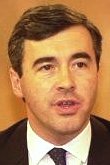Overview
The congress of the PP was the party's supreme body, and could be of either ordinary or extraordinary nature, depending on whether it was held following the natural end of its term or due to any other exceptional circumstances not linked to this event. Ordinary congresses were to be held every three years and called at least two months in advance of their celebration. Extraordinary congresses had to be called by a two-thirds majority of the Board of Directors at least one-and-a-half month in advance of their celebration, though in cases of "exceptional urgency" this deadline could be reduced to 30 days.
The president of the PP was the party's head and the person holding the party's political and legal representation, and presided over its board of directors and executive committee, which were the party's maximum directive, governing and administration bodies between congresses. The election of the PP president was based on an indirect system, with party members voting for delegates who would, in turn, elect the president. Any party member was eligible for the post of party president, on the condition that they were up to date with the payment of party fees and were proposed by at least 50 congress delegates. [3]
This page is based on this
Wikipedia article Text is available under the
CC BY-SA 4.0 license; additional terms may apply.
Images, videos and audio are available under their respective licenses.

















